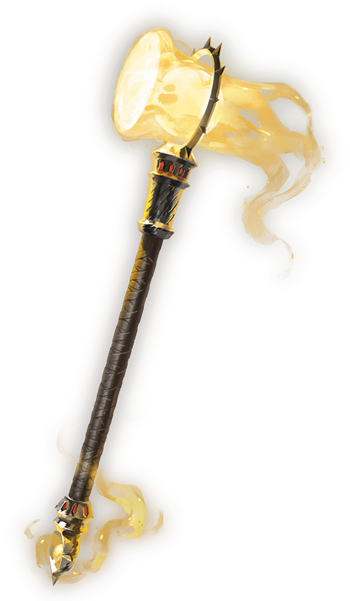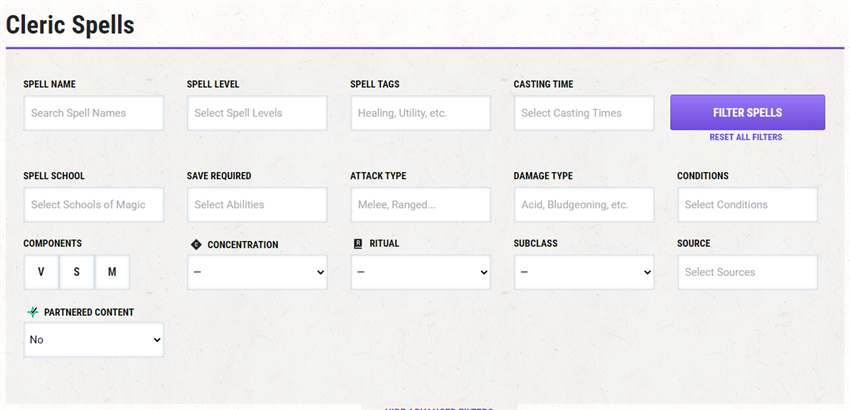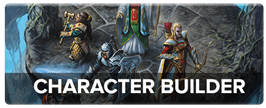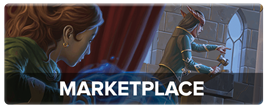 Spell Spotlight examines D&D’s best, worst, and most interesting spells, giving you the tools you need to play a spellcaster who knows exactly what they’re doing. Today, we’re looking at two iconic cleric spells: healing word and spiritual weapon. These spells define the low-level cleric experience, giving characters who master them highly flexible and mobile healing and combat abilities.
Spell Spotlight examines D&D’s best, worst, and most interesting spells, giving you the tools you need to play a spellcaster who knows exactly what they’re doing. Today, we’re looking at two iconic cleric spells: healing word and spiritual weapon. These spells define the low-level cleric experience, giving characters who master them highly flexible and mobile healing and combat abilities.
What is Healing Word?
Healing word is a 1st-level spell available to bards, clerics, druids, and Alchemist artificers. It allows you to heal a creature you can see within 60 feet a number of hit points equal to 1d4 + your spellcasting modifier. For most 1st-level casters, this is an average healing of 4 or 5 hit points. It isn’t quite as strong as cure wounds (which averages 6 or 7 hit points at the same level of play), but its ability to be cast from range and its bonus action casting time make it every bit as powerful as its more classic counterpart.
Though at low levels, the difference between 1d4 of healing and 1d8 of healing may be the difference between healing to half health and healing to full health, this minor distinction practically disappears by the time you and your party reaches 3rd level. This is especially true if you’re a Life domain cleric; your Disciple of Life and Blessed Healer features make healing spells so useful that it hardly matters how much healing the spell itself provides. The mere fact that it heals anything is enough. For example, when casting healing word at 1st level, your Disciple of Life feature adds an extra 3 points of healing—that static bonus nearly doubles the amount of healing the spell provides normally!
A range of 60 feet gives you the ability to heal an injured friend from far away, as long as you have line of sight. Most encounter areas in published D&D adventures aren’t larger than 60 feet in any direction, especially at low levels, so you can effectively heal a friend from anywhere on the battlefield. Even more attractive than its range, however, is its rapid casting time. Since healing word has a casting time of 1 bonus action, as opposed to 1 action, it is incredibly useful for casters who have something else to do as their action. See “Strategies, Synergies, and Struggles” below for a closer look at the power of the bonus action.
What is Spiritual Weapon?
 Spiritual weapon is a 2nd-level spell available to clerics (and Oath of Conquest paladins) that allows them to conjure a weapon that can fly through the air and strike down their foes. This spell deals only a small amount of damage when it’s first cast, dealing only 1d8 + spellcasting modifier damage if it hits. The spell scorching ray is a good spell to compare it to, even though scorching ray is only available to wizards and sorcerers, while spiritual weapon is largely only available to clerics.
Spiritual weapon is a 2nd-level spell available to clerics (and Oath of Conquest paladins) that allows them to conjure a weapon that can fly through the air and strike down their foes. This spell deals only a small amount of damage when it’s first cast, dealing only 1d8 + spellcasting modifier damage if it hits. The spell scorching ray is a good spell to compare it to, even though scorching ray is only available to wizards and sorcerers, while spiritual weapon is largely only available to clerics.
Scorching ray deals damage in large spikes, dealing up to 6d6 fire damage on the turn it’s cast to up to three targets within 120 feet of the caster. On the other hand, spiritual weapon deals a smaller amount of damage spread out over up to a full minute of combat, and doesn’t require concentration. It can be conjured at any point within 60 feet of the caster, making its range less potent than scorching ray, but as noted above, 60 feet is usually more than enough room in small, low-level arenas. If that range isn’t enough, the weapon can move up to 20 feet on each of your turns. The spell’s duration and maneuverability allows it to deal up to a maximum of 10d8 + ten times the caster’s spellcasting modifier over the course of an exceptionally long battle.
A combat encounter that lasts a whole minute of in-game time (that’s ten full rounds of combat!) is an outlandish rarity, however. Few battles last more than 3 rounds, so assuming that the spell deals a total of 3d8 + three times the caster’s spellcasting modifier, its damage is comparable to other 2nd-level spells—an average of 22 damage compared to scorching ray’s average of 21 damage. Spreading the damage out over several rounds is a definite drawback, but spiritual weapon’s versatility (and its hard-to-resist force damage type) make it easy to overlook the consequences its slow-and-steady approach to dealing damage.
Where this spell really shines, however, is in its bonus action casting time and the ability to command it to attack as a bonus action on each of your turns. Most clerics only have a small handful of spells or class features that grant them a bonus action, making it easy to justify using your bonus action to attack with your spiritual weapon on every single turn in combat.
Spellcasting Strategies and Struggles
On the surface, healing word and spiritual weapon are totally different spells; one heals allies, the other hurts enemies. However, there are two main traits that unify these spells: the first is their 60-foot range. These two spells allow the caster to heal and fight well beyond the reach of their hands. With these spells, the battlefield is their oyster.
These spell’s other unifying power, their bonus action casting time, is their greatest strength—and also their greatest weakness. A bonus action casting time is powerful on a turn by turn basis. Being able to cast a healing or damage spell as a bonus action frees up your action for other things—such as making a weapon attack, casting a cantrip, hiding, searching for something, or any number of other Actions in Combat.
Clerics and bards can take the Attack action (which at low levels is often nearly as powerful as a fighter or paladin’s attack), and druids can do the same, especially if they have a quarterstaff empowered by the shillelagh cantrip. Having an action to use after spending a bonus action to heal is useful casters who know offensive cantrips like sacred flame for clerics, primal savagery for druids, or vicious mockery for bards.
Rules Tip: Casting Spells as a Bonus Action
When you cast a spell as a bonus action, you can’t cast another spell in the same turn unless that spell is a cantrip that you cast as an action. Similarly, a bonus action isn’t “inferior” to an action. A spell that has a casting time of 1 bonus action can’t be cast as an action, even though it may seem like an action is superior to a bonus action. Allowing a bonus action spell to be cast as an action is a reasonable house rule to propose to your group, but it’s not part of the official D&D rules.

Since both healing word and spiritual weapon have bonus action casting times, however, this means that they can’t be used together on the same turn. This is even true for the turns after you’ve cast spiritual weapon, since you need to use your bonus action to attack with the weapon on future turns. This bonus action overload means that clerics need to decide whether they want to lean into the role of healing, or the role of offense. You could lessen the impact of this choice by choosing to prepare the slightly less useful cure wounds spell instead of healing word.
Bards and druids have access to healing word, so they’re impacted by this bonus action bottleneck, too! Even though they don’t have spiritual weapon on their class’s spell lists, they still have other spells and class features that require a bonus action to use. A bard can’t cast healing word and give someone Bardic Inspiration. A druid can’t cast healing word and also cast shillelagh—though they can attack with a weapon affected by shillelagh once the spell has been cast.
If you’re playing a spellcaster and want to create a powerful character, try to make sure you can reliably do something with both your action and your bonus action on a turn. You don’t have to always use both (since this can slow down play and hog the spotlight) but having the option to do two cool things per turn instead of one makes you more likely to have fun and effective turns. Bonus action spells can help you do that if you don’t have many class features that can be used as a bonus action (e.g., Bardic Inspiration, Combat Wild Shape, etc.).

If you want to see what spells you can cast as a bonus action, go the Game Rules dropdown at the top of the page, find the Spells header, and click on your class’s name. This will take you to your class’s fully searchable spell list. Once there, open the Show Advanced Filters menu and type “1 Bonus Action” into the Casting Time bar. Hit Filter Spells, and that will show you all the spells on your class’s spell list that can be cast as a bonus action. Have fun discovering small combos, like casting word of radiance as an action on a group of enemies surrounding you, and then immediately casting sanctuary on yourself as a bonus action to avoid retaliation.
What are your favorite bonus action + action combos? What other spells do you want to see spotlighted in Spell Spotlight? Let us know in the comments!
Create A Brand-New Adventurer Acquire New Powers and Adventures Browse All Your D&D Content
 James Haeck is the lead writer for D&D Beyond, the co-author of Waterdeep: Dragon Heist, Baldur's Gate: Descent into Avernus, and the Critical Role Explorer's Guide to Wildemount, a member of the Guild Adepts, and a freelance writer for Wizards of the Coast, the D&D Adventurers League, and other RPG companies. He lives in Seattle, Washington with his fiancée Hannah and their animal companions Mei and Marzipan. You can find him wasting time on Twitter at @jamesjhaeck.
James Haeck is the lead writer for D&D Beyond, the co-author of Waterdeep: Dragon Heist, Baldur's Gate: Descent into Avernus, and the Critical Role Explorer's Guide to Wildemount, a member of the Guild Adepts, and a freelance writer for Wizards of the Coast, the D&D Adventurers League, and other RPG companies. He lives in Seattle, Washington with his fiancée Hannah and their animal companions Mei and Marzipan. You can find him wasting time on Twitter at @jamesjhaeck.











-
View User Profile
-
Send Message
Posted Jul 12, 2020These spells are not even close to broken.
Spiritual is there to help supplement a Cleric's damage so they can be capable, it's nowhere near broken in terms of power level.
Spirit Guardians can deal high damage, but honestly Conjure Animals has the potential of 8d4+32 piercing and 24d6 poison (dc 11 con save for half) at the same length.
The answer is simply you feel they are broken but they are not, nowhere near. NOPE.
-
View User Profile
-
Send Message
Posted Jul 18, 2020I've recently created a human Cleric of Arcana Domain with the Feat: Magic Initiate-Druid. So starting off with 7 cantrips, Druid and Wizard spells, made him a tactician and medic that controlled the battlefield. Now 5th lvl, with another cantrip and Healing word, Spiritual Weapon, and Shillelagh and Entangle from Druid, my imagination goes into ludicrous speed with all my options. Of course I took Druidcraft, Thaumaturgy, and Prestidigition; combing all three for awesome effects that affect whomever in each encounter have made epic memories for my group. Always played Pal's or Rangers, or straight up life cleric; it's been the best xp in d&d since Fiend Folio came out in '81. ;)
-
View User Profile
-
Send Message
Posted Jul 20, 2020Sorry I am picking on one of the easily usable game exploits.... Very familiar with Conjure spells brokenness too. Animate Objects is worse.
Tell me, if antilife shell (6th level) or spirit guardians (3rd) is a better spell. Is the game scaled properly? Maybe reverse the levels, and I'd feel it is okay.
-
View User Profile
-
Send Message
Posted Jul 20, 2020It's a HUGE drain on action economy at higher levels. Suppose we're in a fight and I'm about to Polymorph the dragon in to a bunny to take some heat off the party as they clean up the mooks... but just before my turn my party member goes down. Now I have to cast Healing Word to bring her back up. Sure, I still have my Action, but I can't use it to cast a spell. So what can I do? I'm a Bard with a crossbow. I guess I'll make a crossbow attack, because why not? But man, I really wanted to cast Polymorph
-
View User Profile
-
Send Message
Posted Jul 28, 2020It's painfully obvious to me that you have never played a Cleric, particularly in tier 1-2 of play, and from the rest of your comment it seems like you don't understand how 5e works at all.
Spiritual Weapon is easily one of the best minion spells in the game: It's unkillable, deals good damage, it's only second level, and it isn't concentration. I'd much rather have a Spiritual Weapon up than have a Bonus Action attack, as Spiritual Weapon can engage enemies without me being anywhere nearby.
Healing Word adds your Spellcasting Modifier to the healing, so if you're only healing 2 hp, you've rolled abysmally and you don't know how to build a spellcaster. If your upper limit is 4, you still don't know how to build a spellcaster but at least you can roll decently. In my experience (as Healer/Support is my favorite role to play), Healing Word often heals for 4-9 damage, depending on your Mod and how well you roll. Using Standard Array, you should at least have a +3 in your spellcasting stat, particularly for a full caster like Clerics, Bards, and Druids (Paladins I can understand).
I'm pretty happy Prestige Classes are gone. Having such powerful abilities locked behind prerequisites meant there was a lot less creativity in builds and multiclassing, as you wanted to fulfill those prerequisites ASAP to get the good abilities they unlocked. Multiclassing away from those to fit a certain aesthetic/playstyle was heavily detrimental to your power scaling, particularly for a system without bounded accuracy.
As for your complaint about it not being fun, I have no idea what you mean. I am currently DMing 3 games and playing in 3 more and love all of it. The only thing I can think of that would make you think the way you have expressed is if you enjoy D&D as more of a hardcore numbers game that pits players against the DM, as 5e is definitely not that. 5e was built to be more of a group experience where the players and DM work together to make the game fun for everyone. They "watered down" the system to fit it within a bounded accuracy system, a move that has proved to be beneficial in the extreme, as new players are flocking to the game in droves, and it's never been easier to find a game to play or to even have your first game be one you're DMing. Previous editions were very difficult on new players, new DMs, and non-competitive people alike, as the nature of the game involved a great deal of memorization of static bonuses, varying abilities, and niche rules to overcome the DM or Players and impose your will.
-
View User Profile
-
Send Message
Posted Aug 1, 2020Playing a Life Domain Cleric is awesome until you realize dndbeyond forgets to help you with the math and the lure of "everything is added here" makes you forget your main feature way too often. I really hope it's added in especially bc it seems to be not that hard to just add another plus sign with the value behind since the values are static for each level.
I love both spells a lot though Spiritual Weapon immediately becomes useless if the enemy is moving a lot bc you can move it only 20 feet and enemies that do move usually take more to get to.
-
View User Profile
-
Send Message
Posted Sep 3, 2020you mean Life Domain for clerics?
-
View User Profile
-
Send Message
Posted Sep 21, 2020Why can’t we search for the range type for spell searches yet?
-
View User Profile
-
Send Message
Posted Dec 19, 2020Well put. When I first saw the spell, I though it was stupid, but keep in mind that it is a bonus action, so you can cast healing word and then cast a spell like cure wounds or, at higher levels, mass cure wounds or heal. Not to mention that you can use your action to cast something that does lots of damage or helps the party in some other way. I mean, if you have a spare spell slot, your allies are wounded, and you have a bonus action left to use, what else are you going to do with the bonus action?
-
View User Profile
-
Send Message
Posted Dec 21, 2020I think the point was just made it is a bonus action, so you can cast another spell save for a cantrip. Which, as Tasha's has affirmed, is not true - one spell per round no matter what. The idea is to still let you melee / ranged attack.
-
View User Profile
-
Send Message
Posted Dec 21, 2020Watch out: you can't cast 2 spells in the same turn unless one of them is a cantrip (general spellcasting rule).
So you can't pair Healing Word with a Cure Wounds. Nevertheless, being able to attack or use a Toll the Dead cantrip and bring an ally out of death's door in the same turn is still awesome.
-
View User Profile
-
Send Message
Posted Dec 21, 2020More specifically, if you cast a spell as a bonus action, you can't cast a spell as an action unless it's a cantrip.
-
View User Profile
-
Send Message
Posted Jan 26, 2021Thanks for the tip! Sorry about that, didn’t catch that:
-
View User Profile
-
Send Message
Posted Oct 3, 2022You can't cast two spells on a turn, but what if you use your bonus action to cast a spell, and your action to ready a spell "I ready cure wounds to occur when I next blink". Since the reaction interrupts the turn (so the spell isn't cast on your turn), would that work?
-
View User Profile
-
Send Message
Posted Oct 3, 2022Our party's only talent is making combat take forever.
-
View User Profile
-
Send Message
Posted Oct 3, 2022No, when you ready a spell you do cast it on your turn, you just use your reaction to release it.
This rule helps you when an enemy is Counterspelling you. Step behind a wall, ready the spell, then step back out and release it.
-
View User Profile
-
Send Message
Posted Feb 23, 2023Ended up here while looking for info on spiritual weapon. but I thought I'd give another comment on Healing Word.
In-Combat healing is generally worse for your spell slots than using those slots to do something that could prevent damage from being taken in the first place. Also related, the best time to use healing word is when a party member is already at 0 HP so they'll be up and back in the fight to take their own actions.
-
View User Profile
-
Send Message
Posted Dec 8, 2023Just have to time it right with Spirit Hammer. Turn 1 Spirit Guardians, Turn 2 Spirit Hammer. Turn 3 rejoice.